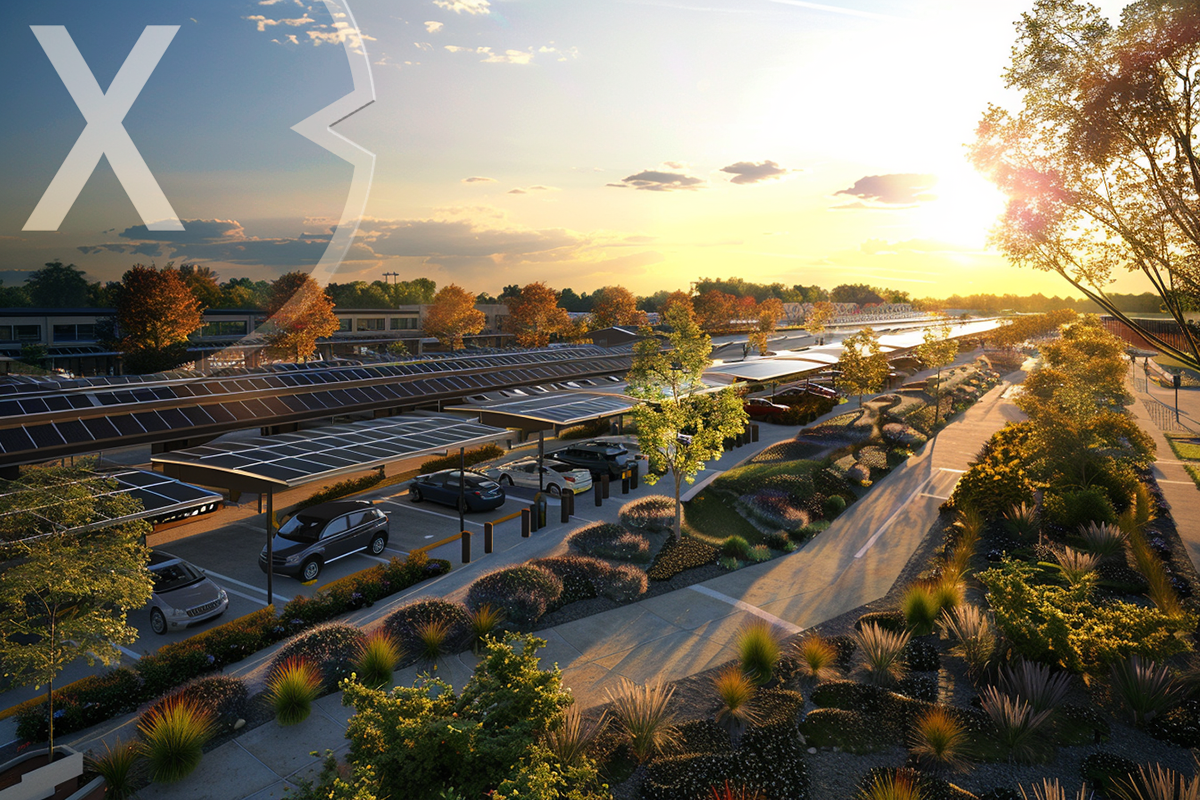
Why only a few parking lots in Germany, Austria, and Switzerland are covered with solar panels – Image: Xpert.Digital
🌍🔋 Ecological benefits of PV systems in parking lots: A previously neglected topic
☀️🌿 Enormous potential: PV systems in parking lots
Although the potential for generating solar energy is enormous, the use of parking lots as sites for photovoltaic (PV) systems remains largely untapped in Germany, Austria, and Switzerland. Covered parking lots with PV systems could offer significant ecological and economic advantages: in addition to electricity production, they contribute to improving the environmental footprint and protecting the climate. However, parking lots are generally unused and thus untapped in terms of their potential for generating renewable energy. An analysis of the obstacles and prospects shows that not only economic and bureaucratic factors, but also structural and planning issues hinder implementation.
🌞 Advantages of PV-covered parking lots
Parking lots with PV canopies could make a significant contribution to the energy transition by generating solar power. On the one hand, large, existing areas that don't require additional sealing can be used efficiently. On the other hand, the canopies protect cars from direct sunlight, which lowers vehicle temperatures, especially in the summer months, thus increasing user comfort. In hot summers, this could reduce the use of air conditioning and therefore fuel consumption. Similarly, PV-covered parking lots reduce the need to clear cars of snow and ice in winter, increasing their attractiveness to users and improving operational efficiency. Thus, PV parking lot canopies offer both ecological and economic advantages, which can be summarized as follows:
1. Renewable electricity generation
The electricity generated by the photovoltaic systems can be used for self-consumption or fed into the grid. This additional electricity contributes to security of supply and reduces dependence on fossil fuels.
2. Improved environmental footprint
The roofs reduce the ecological footprint of the areas, as no additional sealing is necessary. These measures contribute to sustainability and support companies and municipalities in their climate protection strategies.
3. Employee and customer satisfaction
Employees and customers who park in these parking lots benefit from the protection of their vehicles from sun, rain, and snow. Companies can thereby increase their attractiveness as employers and service providers.
4. Cost savings and efficiency
The self-generated electricity can be used directly on-site for charging stations for electric vehicles, which is particularly attractive for companies with large vehicle fleets. This efficient use helps to reduce energy costs in the long term.
💰 Supposedly high costs for substructures and foundations
A major obstacle to the expansion of PV-covered parking lots is the high investment cost. Installing PV systems on parking lots is more expensive than installing conventional rooftop systems. This is primarily due to the costly substructures and foundations required to stabilize the PV systems on open surfaces. Such structures are often expensive and require special materials that must be weather-resistant and sufficiently robust to ensure long-term safety and performance.
Standard suppliers typically offer prefabricated modules, but these are often not optimally adapted to the requirements of PV-covered parking lots. Alternatively, specially developed systems, so-called system-PV parking lots, can help reduce these costs. These systems are often lighter in design and easier to install. However, these innovative solutions are not yet widely available, so many companies are still reliant on more expensive alternatives.
Suitable for:
📋 Bureaucratic hurdles and lengthy approval processes
Another factor hindering the expansion of PV-covered parking lots is bureaucracy. The permitting processes for ground-mounted PV systems are generally significantly more complex and time-consuming than for rooftop installations. While installing a PV system on a flat roof often only requires a simple building permit, the requirements for PV systems in parking lots are more stringent in many regions.
There are several reasons for these bureaucratic hurdles. On the one hand, many municipalities see parking lots as potential building land reserves that they intend to use differently in the long term. On the other hand, residents in some areas fear that large photovoltaic systems could negatively impact the aesthetic appearance of the landscape. Furthermore, some federal states require that such systems be installed only on unsealed surfaces to ensure the sustainable use of land resources. These regulations often lead to delays and higher planning costs.
🚀 Funding and financial support: (Still) insufficient
In Germany, Austria, and Switzerland, various funding programs exist at the federal and state levels to support the expansion of renewable energies. However, many of these programs primarily target conventional rooftop systems and ground-mounted installations in rural areas. For PV parking lot canopies, on the other hand, the available funding is often insufficient to offset the higher installation costs and effort.
The funding situation is particularly complex in Germany: companies and municipalities have to navigate numerous application processes and often face long waiting times. Even though some federal states offer specific programs for parking lots with solar panels, these are usually limited to certain funding rates, meaning not all potential projects can benefit. Furthermore, financial support is often only available for a limited time or is subject to specific conditions. A unified funding concept for solar panel parking lot roofs is still lacking.
🏢 The role of companies and their preference for rooftop systems
Many companies currently rely primarily on rooftop systems to generate solar power. This decision is based on several factors: rooftop systems are not only easier to plan and install, but also benefit from greater public acceptance and generally simpler permitting processes. Furthermore, the investment costs for rooftop systems are often lower, as there are no additional costs for expensive substructures and foundations. Companies with suitable roof space therefore usually prioritize this option before considering the planning and financing of PV-covered parking lots.
Another reason for the preference for rooftop installations is their ease of use. Since rooftop installations are already well-established and technologically mature, companies can integrate these systems into their existing infrastructure. Especially for companies that don't have specific requirements for the use of parking spaces, the decision to opt for rooftop installations is often more obvious from an economic and practical perspective.
🔮 Future perspectives and solutions
For PV-covered parking lots to gain traction in Germany, Austria, and Switzerland, existing challenges must be addressed. One way to overcome financial barriers would be to introduce specific funding programs tailored to the needs of PV parking lot canopies. Such programs could not only cover installation costs but also provide financial incentives to motivate companies and municipalities to implement them.
Reducing bureaucratic hurdles could also make a significant contribution. Simplified approval processes, such as those already in place for rooftop installations in some regions, could reduce planning efforts and increase acceptance of parking lots covered by solar panels. Municipalities could lead by example by promoting the installation of such systems on public parking areas, thereby encouraging similar initiatives in the private sector.
Another approach to promoting parking lots with solar panels would be to integrate these systems into the mobility transition. Since electromobility will gain significant importance in the coming years, parking lots with solar panels could play a crucial role in providing charging stations. The solar power generated on-site could be fed directly into charging stations, thus contributing to the charging of electric vehicles. This would not only reduce CO₂ emissions in the transport sector but also accelerate the expansion of the charging infrastructure.
📣 Similar topics
- ☀️ Discover solar energy potential in parking lots in Germany, Austria, and Switzerland
- 🚗 Green parking areas: Photovoltaics on parking lots
- 🌿 Sustainable energy use: Parking lots with PV systems
- 💡 Solar future: Parking lots as energy sources
- 🔋 Energy transition on asphalt: Opportunities for PV parking lots
- 🌍 Climate protection through solar parking lots in Central Europe
- 🏗️ Challenges and innovations in PV roofing
- ⚡ Solar parking lots: A sustainable way to supply energy
- 💶 Funding and financing: PV parking spaces in Germany, Austria, and Switzerland
- 🏞️ Future vision: Photovoltaics in the urban landscape
#️⃣ Hashtags: #SolarEnergy #Sustainability #EnergyTransition #Photovoltaics #Innovation
🅿️🚘 Eco-PV solar carport: planning security for €6,000 per parking space, turnkey photovoltaic systems for parking spaces and parks
Eco-PV solar carport: planning security for €6,000 per parking space, turnkey photovoltaic system - Image: Xpert.Digital
The prices for a solar carport are usually between €3,500 and €25,000 per parking space. Logically, the services and quality vary depending on the price. An objective comparison shows that the price-performance ratio is crucial.
More about it here:
We are there for you - advice - planning - implementation - project management
☑️ From simple solar carports to large parking spaces
☑️ Your individual photovoltaic parking space advice with Xpert.Solar
Xpert.Solar is your ideal partner for the planning, consulting and construction implementation of ground-mounted photovoltaic systems and agricultural photovoltaic projects due to our many years of experience and expertise in the solar energy industry. Xpert.Solar has an experienced team of professionals that offers tailored solutions to farmers and investors. From location analysis to financial and legal advice to technical implementation and monitoring, Xpert.Solar supports its customers professionally and reliably to ensure successful and sustainable implementation.
I would be happy to serve as your personal advisor.
You can contact me by filling out the contact form below or simply call me on +49 89 89 674 804 (Munich) .
I'm looking forward to our joint project.
Xpert.Digital - Konrad Wolfenstein
Xpert.Digital is a hub for industry with a focus on digitalization, mechanical engineering, logistics/intralogistics and photovoltaics.
With our 360° business development solution, we support well-known companies from new business to after sales.
Market intelligence, smarketing, marketing automation, content development, PR, mail campaigns, personalized social media and lead nurturing are part of our digital tools.
You can find out more at: www.xpert.digital - www.xpert.solar - www.xpert.plus

